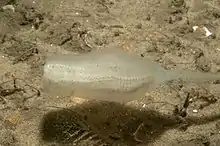Sycozoa pulchra
Sycozoa pulchra, (common name - stalked ascidian)[2] is a sea squirt in the family Holozoidae, first described by William Abbott Herdman in 1886 as Colella pulchra.[1][3] The taxonomic decision which determined the name, Sycozoa pulchra, and the species' synonymy was given by Patricia Kott in 1990.[1][4]
| Sycozoa pulchra | |
|---|---|
 | |
| Scientific classification | |
| Domain: | Eukaryota |
| Kingdom: | Animalia |
| Phylum: | Chordata |
| Subphylum: | Tunicata |
| Class: | Ascidiacea |
| Order: | Aplousobranchia |
| Family: | Holozoidae |
| Genus: | Sycozoa |
| Species: | S. pulchra |
| Binomial name | |
| Sycozoa pulchra (Herdman, 1886) | |
| Synonyms[1] | |
| |
It is found in coastal waters from Queensland, New South Wales, Victoria, Tasmania, South Australia to Western Australia, and off Indonesia.[1]
Description
This sea-squirt is composed of a cylindrical colony of paired rows of zooids on a stalk. It is usually transparent with white tipped siphons. The colony can grow to 6 cm, on a 30 cm stalk. They are seen more commonly in the cooler months when the colony heads regenerate.[2]
They are found in sediments, on reefs, in sea grass meadows and sponge gardens to depths of 25 m.[2]
References
- "Australian Faunal Directory: Sycozoa pulchra". biodiversity.org.au. Retrieved 25 June 2021.
- Patullo, B. (2011). "Stalked Ascidian, Sycozoa pulchra". Taxonomic Toolkit for Marine Life of Port Phillip Bay, Museum Victoria. Retrieved 25 June 2021.
- Herdman, W.A. (1886). "Report on the Tunicata collected during the voyage of H.M.S. Challenger during the years 1873–1876. Pt II, Ascidiae compositae". Report on the Scientific Results of the Voyage of H.M.S. Challenger 1873–1876, Zoology. 14 (38): 1–425 [106].
- Kott, P. (1990). "The Australian Ascidiacea Pt 2, Aplousobranchia (1)". Memoirs of the Queensland Museum. 29 (1): 1–266 [149].